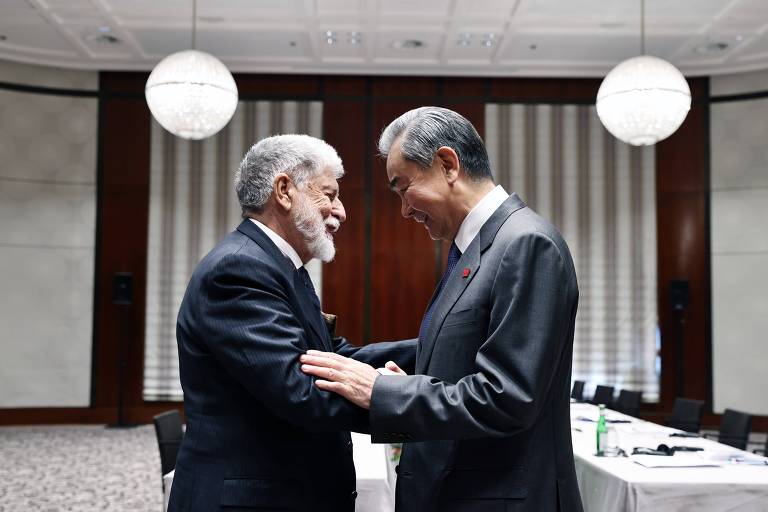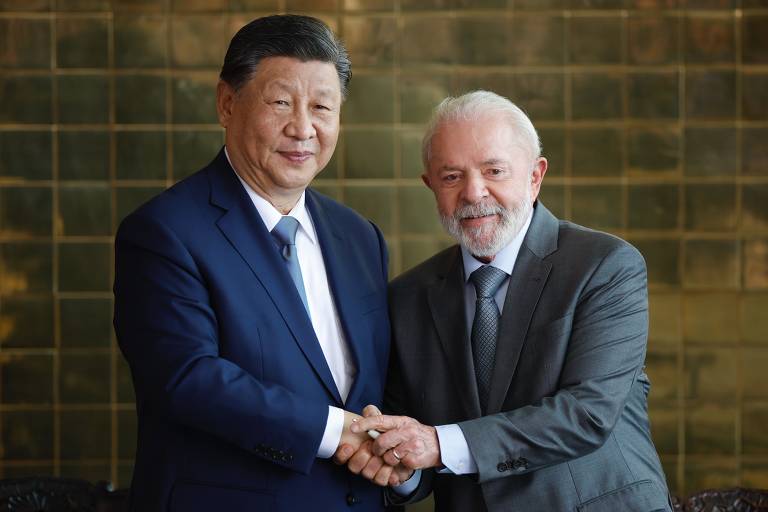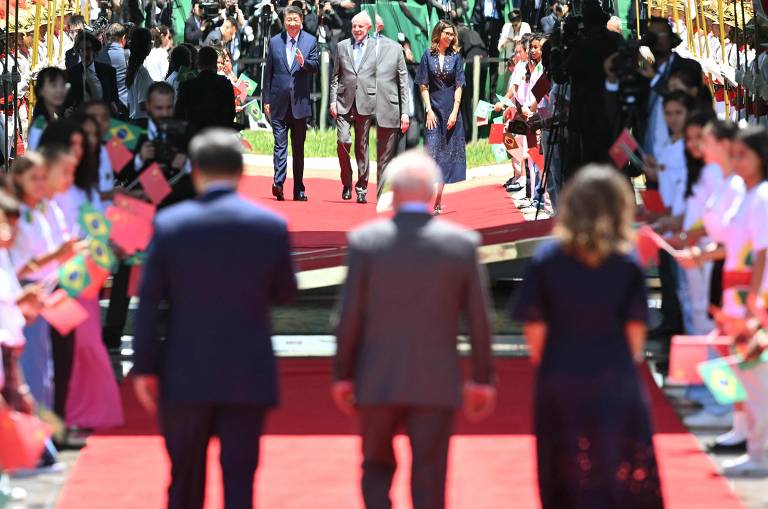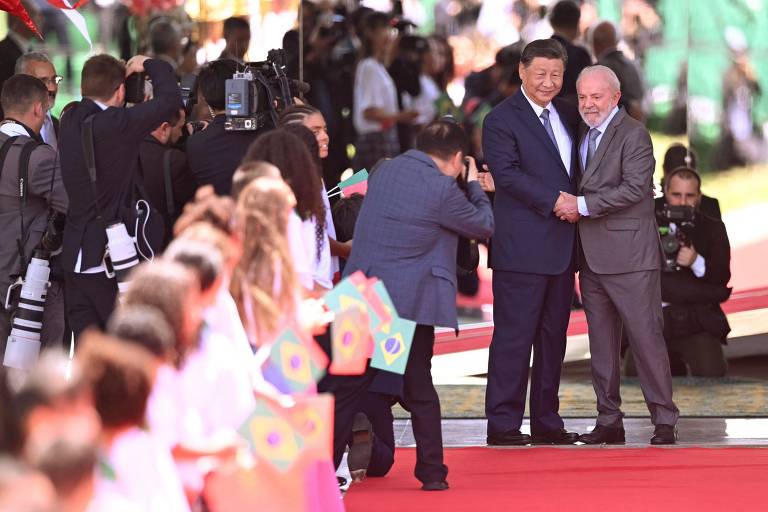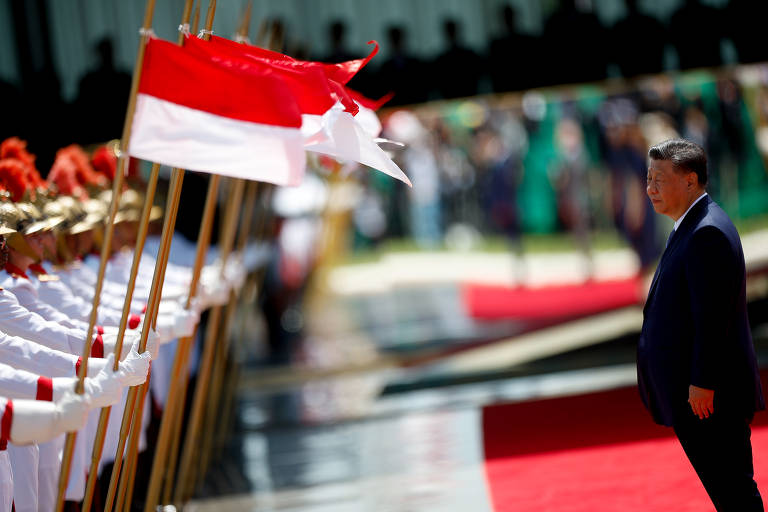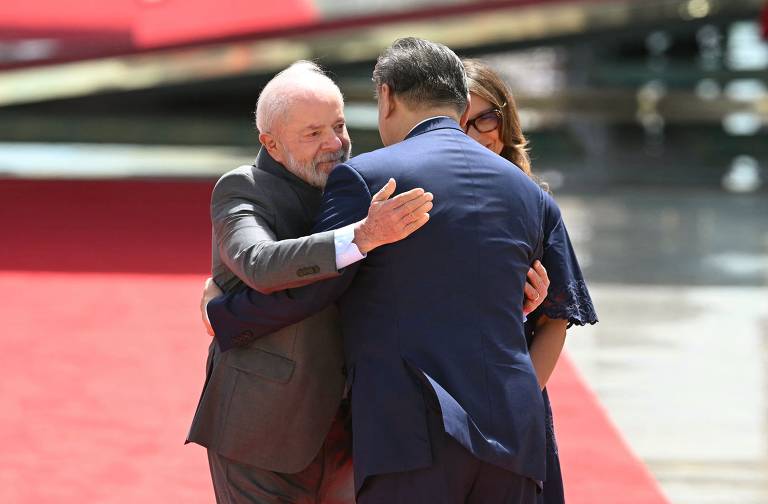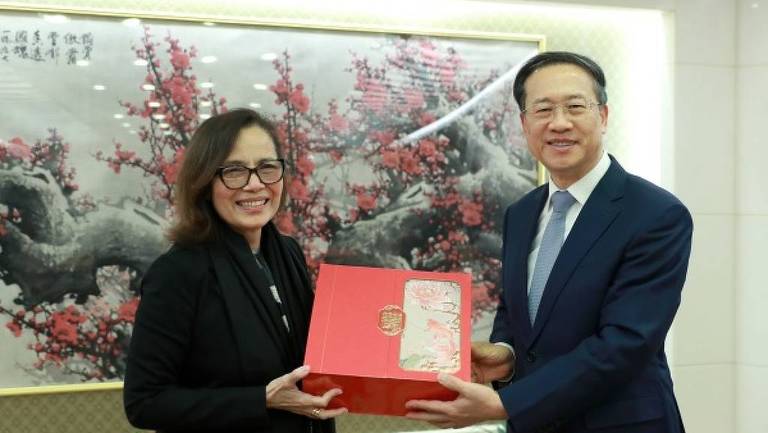Nobel não é importante, quero ser como Shakespeare, diz autora chinesa Can Xue
NELSON DE SÁ
A chinesa Can Xue, de 72 anos, liderou as apostas para o Nobel de literatura nas duas últimas edições. Um ano atrás, estava na dianteira na reta final com probabilidade de dez para um, segundo a empresa londrina de apostas Ladbrokes. Perdeu para a sul-coreana Han Kang.
Questionada, não hesitou. "Não considero o Nobel particularmente importante. Meu objetivo é me tornar um escritor como Shakespeare ou Dante."
Sua obra mistura tradições chinesas com experimentalismo ocidental. Ela conta por que enquadra sua escrita como performance, um ato que convida os leitores a não só observar, mas dançar a seu lado.
Diz que cada personagem é um fragmento da alma da autora e cada história é um teste desses fragmentos em um mundo em que explorar o amor e a liberdade é difícil, um tema central de "Histórias de Amor no Novo Milênio", que é lançado agora pela Fósforo.
Por fim, Can Xue confronta suas experiências durante a Revolução Cultural. Rejeita o envolvimento direto com fenômenos históricos ou sociais, dizendo em vez disso como tais experiências, transformadas no "oceano da memória", tornam-se a força motriz por trás da busca de liberdade de suas personagens.
* * *
— Suas obras são traduzidas e discutidas globalmente, e espera-se que você ganhe o Nobel. Ele significa algo para você? Acha que é capaz de reconhecer, por exemplo, a diversidade das vozes literárias chinesas?
— Não considero o Prêmio Nobel de Literatura particularmente importante. Meu objetivo é me tornar um escritor como Shakespeare ou Dante. Se eu ganhar o prêmio, a voz da literatura chinesa certamente será ouvida. E creio que, mesmo que não ganhe, minha voz ainda será ouvida. Isso foi comprovado em países ao redor do mundo. Estou confiante nisso porque minhas obras são realmente as mais universais e humanas, as melhores.
— Por que você descreve sua escrita como performance? E qual seria o nosso papel, como leitores?
— É porque ela pode ser comparada a uma espécie de dança física que ativa as funções do corpo humano. Os humanos possuem essa função, mas, ao longo da história, os povos de civilizações avançadas a esqueceram, substituindo-a por outras funções menos essenciais. Minha escrita é o despertar e a ressurreição dessa função ancestral. Sempre acreditei nisso. Quem pode se tornar meu leitor? Acho que são aqueles que podem dançar comigo. Estimulados e inspirados pela minha performance, eles iniciam sua própria dança inovadora.
— Sendo uma das raras escritoras chinesas contemporâneas com obras celebradas nos círculos literários estrangeiros, o que você acha que os leitores encontram de maior ressonância em suas histórias? Há temas nelas que requerem contexto adicional para compreensão?
— Creio que o que mais atrai leitores internacionais na obra é a maneira como captura a natureza humana mais universal em seu potencial máximo. Todos vivenciam graus variados de repressão na vida secular e anseiam por liberar seus desejos e emoções. Os romances oferecem um alívio profundamente satisfatório. Essas obras, com seus enredos inusitados, evocam paixão, atraindo inconscientemente para seu reino, liberando nossa própria criatividade em busca de um estilo de vida livre.
Entender as obras requer pouco conhecimento prévio da cultura chinesa. Elas são a essência dessa cultura, únicas, porém adaptáveis às necessidades espirituais e físicas de cada indivíduo. Os leitores que entram e dançam com elas as compreendem verdadeiramente.
— A língua chinesa é conhecida pela ambiguidade poética. Há desafios na tradução de seus escritos para o português decorrentes das nuances da gramática ou do vocabulário chinês?
— O chinês é difícil de traduzir. Mas creio que todas as línguas do mundo são comunicáveis. As línguas ganham vida através da comunicação. Imagino leitores no seu país lendo as obras. Que cena linda deve ser.
— Algum personagem de "Histórias de Amor no Novo Milênio" soou particularmente pessoal para você? Ou que você tenha visto como representativo de mudanças geracionais mais amplas de como o amor é vivenciado na China?
— Nunca descrevo experiências mundanas superficiais, minha literatura é uma espécie de literatura essencial. Cada personagem e objeto em meu livro é um fragmento da minha alma e do meu corpo. No entanto, permaneço desapegada das emoções mundanas. Simplesmente sublimo esses desejos, transformando-os em uma bela canção de humanidade. Coloco os personagens em ambientes hostis para testar sua humanidade e ver até que ponto cada uma de suas paixões pode ser liberada.
Este também é o significado do título do livro, "Histórias de Amor no Novo Milênio". Nele, interrogo a mim mesma e ao coração humano —como será nossa busca por amor e liberdade no novo século? Acredito que cada personagem do livro dá ao leitor uma resposta satisfatória. Em outras palavras, a própria atuação do autor deve inspirar uma atuação semelhante no leitor.
— Sua escrita reúne elementos de tradições culturais chinesas, como contos populares e taoísmo, com influências estrangeiras, como Kafka e Jorge Luis Borges. Como você equilibra essas duas correntes culturais?
— Essa pergunta exigiria um livro substancial para ser respondida. Estou trabalhando nele no momento. É um tratado filosófico sobre o desejo humano, que entrelaça filosofia antiga com ficção experimental. Escrevo há mais de uma década e vou enviar o livro à editora da Universidade de Pequim para publicação no próximo verão. Considero um livro que combina influências chinesas e ocidentais. Tornei as duas culturas mutuamente essenciais, criando uma visão de mundo e uma metodologia completamente novas.
— Você já mencionou Borges como uma influência literária fundamental. Quais aspectos específicos da escrita dele moldaram mais profundamente as suas escolhas?
— Borges não é o único escritor que influenciou fundamentalmente meu trabalho. Há uma longa lista deles: Dante, Shakespeare, Cervantes, Goethe, Musil, Kafka, Calvino, Bruno Schulz e assim por diante. A influência mais fundamental desses escritores, incluindo Borges, é que eles moldaram minha visão de mundo, permitindo-me ver o universo e a mim mesma sob uma luz completamente nova.
A influência de Borges está principalmente em sua obsessão pela prática criativa e em suas belas descrições de jogos simétricos e da integração do universo e do humano. Acredito que meu trabalho hoje continua sua narrativa. Em outras palavras, acredito que sua narrativa, como a de outros escritores experimentais antes dele, permanece atual e pouco apreciada.
— Por que você considera seu trabalho desvinculado de sociedade, história, política, economia e assim por diante? Quais são suas principais preocupações?
— Acho que é um hobby pessoal. Minha escrita não se concentra nos fenômenos que você mencionou. Meu foco está na exploração da essência da natureza humana. Meu trabalho também incorpora material social, cultural e político, mas esses materiais servem a um propósito diferente. Acredito que todos os romancistas experimentais escolhem e utilizam o material da mesma forma que eu. De modo geral, gosto de colocar personagens em situações desesperadoras para compeli-los a agir. Esses cenários geográficos ou históricos não são específicos de um país específico, como a China, mas sim de um cenário utópico.
É claro que, por conveniência, geralmente prefiro material chinês. Os leitores devem observar que essas descrições não são realistas; são materiais que extraio de experiências mundanas para criar uma utopia crua. Quero explorar como as pessoas podem se comportar em situações desesperadoras. Portanto, todos os personagens em minhas obras são partes fragmentadas de si mesmos, todos bons, sem nenhum verdadeiramente mau. Ler minha obra exige uma certa compreensão filosófica, uma necessidade de ver o enredo da perspectiva de toda a humanidade. Caso contrário, é difícil entrar na história, e só se pode vagar pela periferia.
— A Revolução Cultural foi um período de dificuldades para sua família e de censura extrema na China. Apesar dos desafios, suas primeiras leituras de obras filosóficas e literárias continuaram. Como você fez isso? E esse ambiente restritivo inspirou sua maneira de escrever por meio de simbolismo ou subtexto?
— Acho que minha explicação para a pergunta anterior já respondeu. Eu era uma criança sensível e reflexiva, mas nunca me baseei diretamente em experiências da infância ao criar. Toda experiência acumulada serve ao meu processo criativo, que irrompe de uma fonte central. Construo vários aspectos essenciais da natureza humana, permitindo que os personagens cresçam por meio dessas lutas.
Todas essas práticas levam ao surgimento de um reino utópico após o outro. Acredito que o trabalho de escritores experimentais como nós é a forma mais pura de criação. Comprimimos o desejo, permitindo que ele irrompa do centro de nós mesmos, criando um milagre da natureza humana após o outro, um após o outro, do nada.
A Revolução Cultural e o movimento antidireitista certamente tiveram um impacto profundo na formação da minha personalidade, mas esses elementos superficiais não são visíveis em minhas obras. Eles afundaram nas profundezas do oceano da memória, onde passaram por uma transformação fundamental. Quando irrompem do centro de nós mesmos, deixam de ser as experiências superficiais que já foram. Tornam-se a força motriz por trás da busca de liberdade de cada personagem.
Histórias de Amor no Novo Milênio
Preço R$ 104,90 (400 págs.); R$ 73,40 (ebook)
Autoria Can Xue
Editora Fósforo
Tradução Verena Veludo Papacidero
Foto: A escritora chinesa Can Xue, autora de 'Histórias de Amor no Novo Milênio' - Chen Xiaozhen/Divulgação.
FSP 19.09.2025
